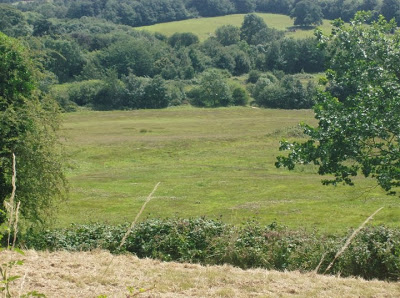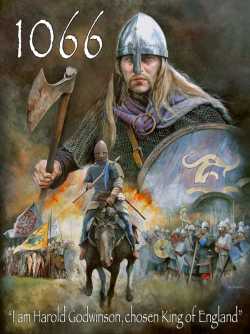Duke William allowed five minutes under the hour to rest, and then the war horns blared for the third time. Again, he had spent the precious respite planning. For this third try they were deployed under his own command in one single force, not three divisions. He had lost many men, more horses - knights would be fighting on foot, for the remounts were all used. Their position was desperate, the outcome uncertain, there was no choice but to go for this one last assault. Were they to withdraw, where would they go? The English would hunt them down, finish them like game at bay. Whether they fled or fought, death waited. Better to die fighting than running like a whipped hound, to be hanged or burnt or starved… but then, for William, if captured, death was a certainty. That Harold might allow him and his followers their liberty did not occur to him.
William's survival depended on his men destroying that shield wall. Harold's on holding it firm. Two things made the Duke the leader that he was: his determination to win and his ability to recognise mistakes and to change tactics. Harold had placed his army in the most appropriate formation, had chosen his ground well and had commanded with skill and precision. That fact William had conceded after his first assault had been so easily deflected. Both men were worthy generals, but only one could win. Skill no longer seemed to come into it. Luck would be playing a lead role in the outcome of this day, but William was not going to risk what was left him on the chance roll of a die. This attack would be different and, if they did not win through, then perhaps they were deserving of death.
Harold watched almost dispassionately as the tidal wave of men rolled forward again. The front line of cavalry and infantry were protected with high-held shields; archers were placed at the rear. Slower on this occasion, not tiring themselves, respecting the disrupted state of the ground, the slope of the hill and their own exhaustion, they trundled nearer. It would take a while for them to reach the top - could something be done to slow them more? "He is a formidable man." Harold admitted to his personal bodyguard. "And a rare one, for he uses his brain to seek solutions to a problem. Pass word that we will at last require our archers - set them to the front - but they are to be ready to step back as soon as the line is approached. The shield wall must be held!"
The abuse hurled by the English was as searing as any barbed arrow, but words could not maim or injure, unlike the hail of missiles that was propelled downwards. Arrows first, then anything that could be thrown. Clods of turf, severed limbs, dead men's boots. The head of a horse, even apple cores and empty ale skins. Anything, everything to deflect the attention of the Norman ranks. A man would duck his head, raise his shield arm at something that flew through the air from a waiting battle line. It might only be the harmless, shrivelled core of an apple, but then again, it could be a dagger blade…
The Norman advance shook, but only briefly; it came onwards. The English reset their shields, braced their legs and shoulders, and waited.
Needing to distract the attention of the front line, to sow confusion so that the cavalry and infantry could come in close without danger, the Norman archers had come to a standstill - were aiming - let loose their arrows in a high, wide trajectory to fall from above. How many men would be fool enough to look up as that cloud of hissing, whining shafts sped overhead? Enough? Would enough stop an arrow in the vulnerable, unprotected flesh of the face? Enough to do damage to the shield wall? And how many had instinctively ducked, cowering from the death-tipped cloud, had crouched, exposing their shoulders and backs to the same spitting barbs?
"Clever!" Harold thought, as he watched, listening to the screams of his wounded men. "For all I think of him, I admit Duke William is indeed a capable man."

Senlach Ridge, Battle, Sussex
They joined, Norman breath heating on English faces. Eye to eye, sword to sword. The front line was weakened - but holding. Hand-to-hand fighting, the weight of the Norman advance crashing against the shield wall, as if some great devil-driven sea storm was mercilessly battering at a shoreline. The defence coming as desperate and brutal. The Duke appeared to be everywhere at once - to the fore, to the rear. To left, right, to centre. Shouting, urging, cursing. His horse was killed from under him - two now had he lost. He leapt clear as the animal crashed downwards, screamed at the nearest rider to dismount, took the animal for himself. He must be mounted, must be seen! Must drive these cur-sons on!
For one whole hour they fought. So rarely did a battle last this long - nearly the whole of the day had they fought here, up on this ridge seven miles from the coast at Hastings. Harold himself was now fighting; had come nearer the front with the best of his housecarls. The line that had held so long was beginning to break and to crumble; too many were dying; not enough were there to take their places.
And then the breaches came, great gaps of dead men, and the Norman cavalry were through, the advantage, suddenly, exultantly, swinging towards the Normans. William's helmet was dented by an axe blow; Robert fitz Erneis rode for Harold's standard, intent upon seizing it, killed several men with his sword before being cut down by the cold metal of English axes.
The mêlée was man against man, group against group, nothing left of that wall that had stood, unshakable, since the ninth hour of the morning. Naught Harold could do, save stand and fight. Hope and pray that they could last out until darkness fell. It was not, now, a matter of winning, but of staying alive. The light was fading. Soon the sun would be down. The housecarls fighting for their king at the centre of the ridge were growing smaller in number, gathering closer around the two royal standards. There was no time to think, to analyse, to feel. Only once, briefly, did Harold wonder that perhaps he ought to lay down his great death-edged axe and surrender. But he remembered the Norman carnage created at Dinan. No, this was the better way to die.
Four mounted men were closing in, two of whom had a personal grudge against this Saxon King: Eustace de Boulogne, who had suffered humiliation at the hands of Godwine, Harold's father, and Guy de Ponthieu, who had lost the hope of a chest of gold because of Harold. With them were Hugh de Montfort and Walter Gifford, all from the Franco-Flemish side, now forcing their way inwards from the eastern end of the ridge. They showed no mercy to the dying or the wounded as they hacked their way through towards Harold with a bitter thirst for revenge that had taken hold, along with the unstoppable fever of bloodlust. The King's guard tried to protect their lord, but it was hard to stop the vicious tide of bloody death. They were tired, their arms felt like stone, their sight was blurring, but they fought on, protecting their beloved lord King.
To the western end Duke William had been unhorsed again, the animal had slipped and fallen, unseating his rider, but was unharmed. The Duke remounted leisurely, for his army was now upon the ridge and the English were broken, beginning to run. He rode at a walk, issuing commands, encouraging that last, final push. Could not believe his fortune. Sweat was running into his eyes. The sun was setting, a golden glow along the western horizon, red fingers of light spreading outward, turning the low grey cloud that was bringing in rain to a lurid, dark pink. He removed his helmet, wiped his dirt-grimed hand across his face. He was about to win the day! By God's good Grace, he was about to win England for himself!
All those doubters, all those bastards who had whispered and connived behind his back - hah! How he would laugh in their face!
And Harold... There would be no mercy for that son of a Flemish whore!
Smiling, William rode at ease on up the hill. His thoughts relishing the different ways he would put this turd of an Englishman, who dared call himself King, to death. He heard the whish of an arrow, the sing-song sound of its flight. Turned his head, half curious, half concerned.
He was dead before his body tumbled the ground, the horse, startled, shying aside, galloping in fear down the hill, bucking and kicking out.
The arrow shaft quivered, as if in exulted excitement, buried deep within the Duke's eye socket, deep into his brain.
The shout went up in English and French; spread, was repeated, clarioned from mouth to mouth as the fighting faltered, ceased. "Le Duc est mort! Le Duc est fini!"
"The Duke is dead! The Norman Duke is dead! Long live Harold, King of England!"
 "Harold the King"
"Harold the King" "I Am The Chosen King"
"I Am The Chosen King"



